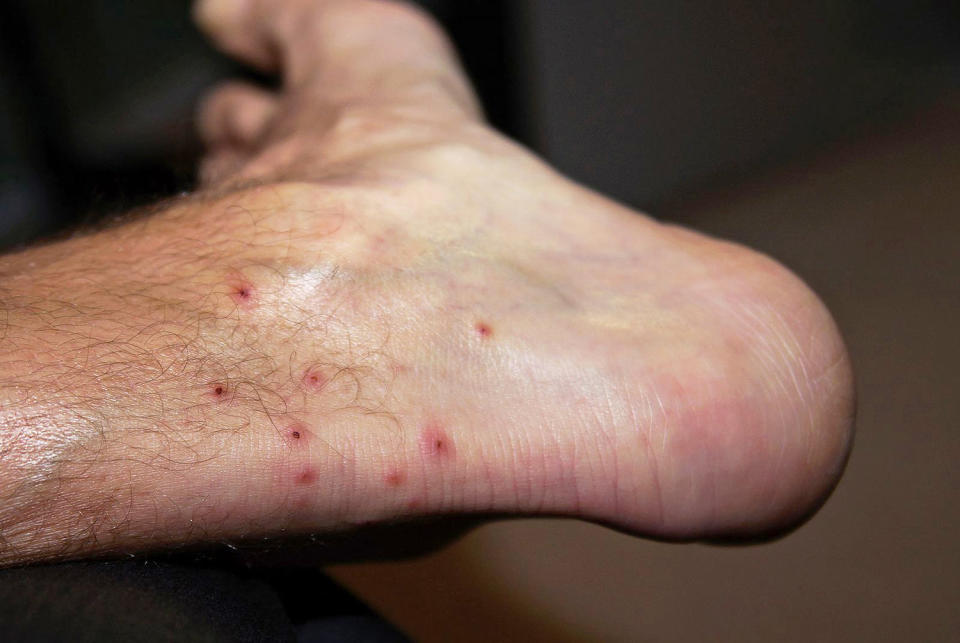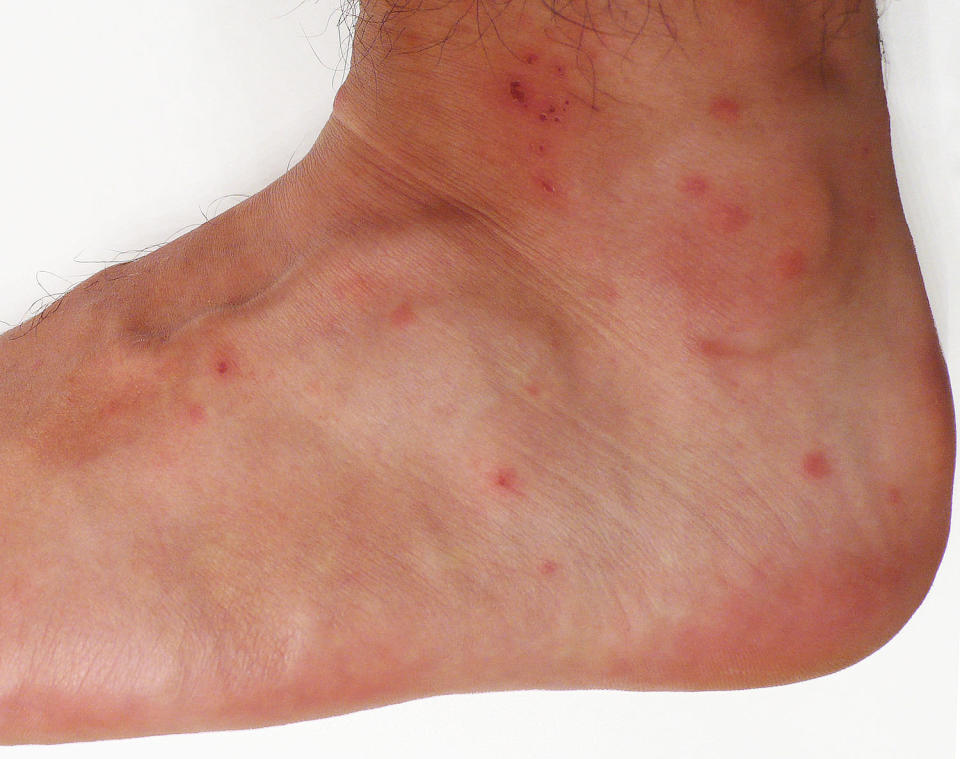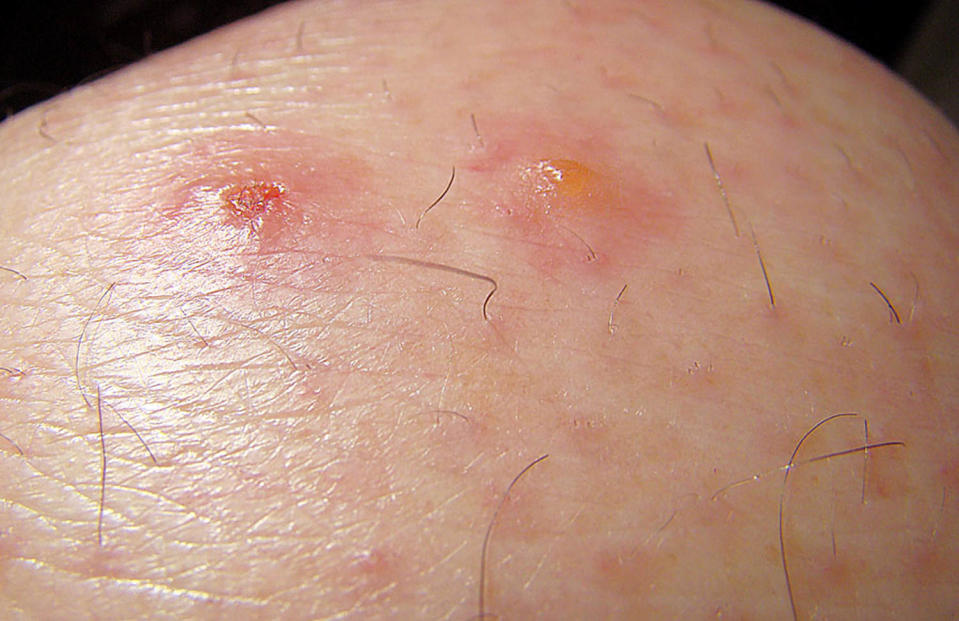What do chigger bites look like? Photos to help identify and treat them
Do you know what chigger bites look like? The tiny mites may leave behind small, itchy red bumps around your ankles that can be easily confused for other types of insect bites.
"They tend to be in grassy areas, under vegetation and in shady areas with high humidity," Jody Gangloff-Kaufmann, Ph.D., an urban entomologist and coordinator with the New York State Integrated Pest Management community program at Cornell University, tells TODAY.com.
So, for instance, you’re likely to encounter them at the “edge of a wooded area where the grasses are a little high,” she adds.
But chiggers — also called berry bugs — are more common in some parts of the U.S. than others. Because they thrive in hot, humid weather, you’re most likely to find chiggers in the south and southeastern U.S. They’re also most active in the summer, per the Cleveland Clinic.
While chigger bites aren't generally harmful, they can still be itchy and uncomfortable. Here's how to identify and manage chigger bites, according to experts.
What are chiggers?
The chiggers that bite humans “are the larval stage of a mite that is otherwise harmless and actually beneficial,” Gangloff-Kaufmann says. “They eat other mites and other plant-damaging critters.”
Chiggers are closely related to ticks and spiders, but they're almost invisible to the naked eye, according to Cleveland Clinic. After chiggers hatch, they feed on the skin of a human or animal until they fall off and turn into an adult mite.
The mites can be red, orange or yellow depending on how old they are. Because of their vibrant color, they’re sometimes visible on the skin. Additionally, adult chiggers have eight legs whereas the larvae version only have six, according to the Missouri Department of Conservation.
What do chigger bites look like?

Chigger bites appear as small, itchy red bumps that show up in clusters, MedlinePlus explains. The bites may be pimple-like, blister-like or similar to hives.
They typically appear in specific areas on the lower body where tight clothes meet skin, like at the cuffs of your socks or the waistband of your leggings. Chiggers might also bite in between warm skin folds, MedlinePlus says. When chiggers bite, it’s usually painless — the itching begins hours later.
When trying to identify chigger bites, doctors are “looking for little red bumps, typically on the lower legs and ankles,” Dr. Melissa Levoska, an assistant professor of dermatology at the Icahn School of Medicine at Mount Sinai, tells TODAY.com.
Patients with chigger bites will often report being “out in the grass in a wooded area,” Levoska says. It’s a common scenario especially after spending time “in areas where there’s tall grass,” she says.
That’s where the chiggers will lay their eggs, she explains, “and then they’ll attach to your clothing and then get on your skin to actually bite you.”
Chigger bite symptoms

The symptom of chigger bites that you're most likely to notice is, of course, the bites. Chigger bites tend to be small red, raised pimple-like itchy bumps.
If you have chigger bites, there are some other symptoms you might also experience. According to MedlinePlus, other symptoms of chigger bites can include:
A rash, which typically only appears on parts of skin that were exposed to the sun.
A secondary skin infection, with symptoms such as swelling and pus, due to scratching.
How do you get chigger bites?

People are likely to encounter chiggers while hiking, having a picnic, working outside or really “doing anything in the great outdoors,” Gangloff-Kaufmann says. “It could be farming or it could be mowing your lawn.”
The Cleveland Clinic notes that chigger bites can be difficult to prevent because of how small chiggers are and they way they can cling to clothing.
But there are still a few ways to prevent chigger bites.
How to prevent chigger bites
When spending outdoors in areas where chiggers might be lurking, protect yourself with long-sleeved shirts, tall socks and pants tucked into boots.
Treat your clothing with insect repellents before going outside.
Use mosquito repellent or another bug spray.
Avoid grassy, wet and wooded areas during warm temperatures, especially in the summer.
How long do chiggers stay on after biting you?
Chiggers can stay on the skin after the initial bite, according to Cleveland Clinic.
When they mites bite, they release a digestive enzyme that allows the chigger to drink skin tissue without burrowing into it. Due to this enzyme, the itching is most uncomfortable in the first one to two days after the bite. But once you notice the itching feeling and begin to scratch, the chigger will fall off.
Most chiggers that attach to humans fall off or die within hours, according to the University of Florida. But it's possible for chiggers to stay on skin for as long as a few days.
After about three days of feeding, they can drop off and move into the next phase of their lifecycle, called a nymph (which precedes the adult phase).
How long do chigger bites last?
A human host usually notices the bite within several hours, and the itching is most intense the first one to two days. Chigger bites usually slowly go away after two weeks, per the Cleveland Clinic.
Home remedies for chigger bites
Doctors don't see chigger bites as often as some other types of insect and parastie bites, Levoska says, because they aren't generally dangerous and don't transmit diseases.
In most cases, the bites go away within a week or two on their own. And patients can usually manage the itchiness on their own at home without ever seeing a doctor, Levoska explains.
At-home treatment options can include:
Soothing anti-itch lotions with ingredients like camphor, calamine or menthol.
Topical anesthetics, such as products containing pramoxine.
The itching is usually at its worst 24 to 48 hours after the bites appear, Cleveland Clinic explains. From there, the itchiness will subside and eventually stop completely after two weeks.
When to see a doctor for chigger bites
If your chigger bites aren't getting any better with at-home remedies and over-the-counter treatments, it's worth talking to a doctor, Levoska says. They can prescribe stronger medications, such as a topical steroid or antibiotic in the event of a secondary infection.
A doctor can also help you figure out if what you think is a chigger bite may actually be something else.
This article was originally published on TODAY.com

